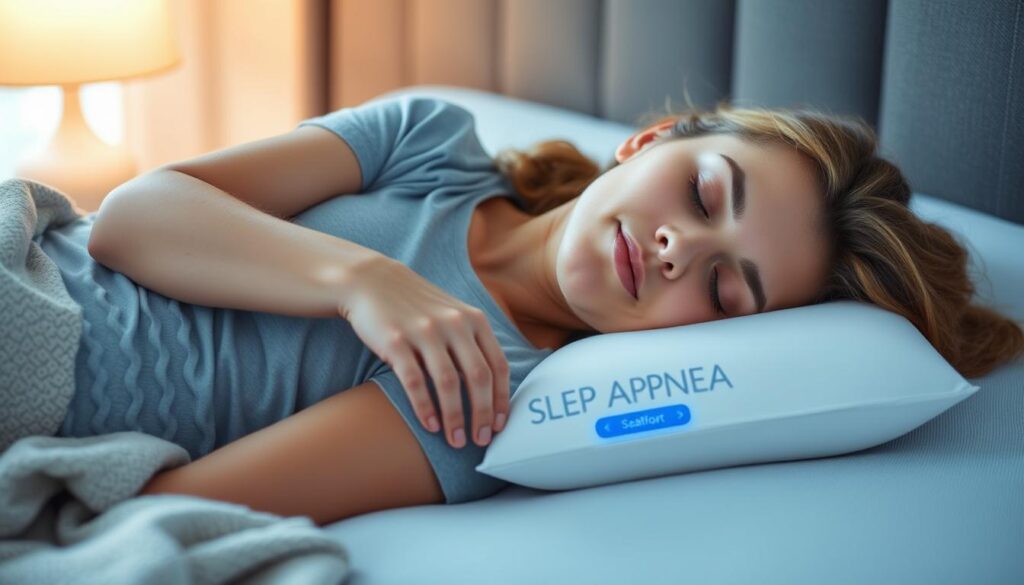Quality sleep is crucial for overall health, and for individuals suffering from sleep apnea, a good night’s rest can be particularly challenging. Choosing the best sleep apnea pillows can make a significant difference by improving airway alignment and enhancing sleep quality.
While sleep apnea requires proper medical treatment, often involving CPAP therapy, a specialized pillow can enhance comfort and potentially reduce symptoms. These pillows are designed to provide better support for different sleeping positions, helping to improve breathing and reduce mask leaks for CPAP users.
This article reviews the top pillows for sleep apnea sufferers, categorized by type and features, to help you make an informed decision based on your specific needs and sleeping position.
Key Takeaways
- Specialized pillows can improve comfort and reduce sleep apnea symptoms.
- The right pillow can help reduce mask leaks for CPAP users.
- Pillows designed for side sleeping and back sleepers are available.
- Memory foam pillows can provide the necessary support and pressure relief.
- Choosing the right pillow is crucial for managing sleep apnea.
Understanding Sleep Apnea and How Pillows Can Help
Sleep apnea, a prevalent sleep disorder, is marked by pauses in breathing or periods of shallow breathing during sleep. This condition can significantly affect an individual’s quality of sleep and overall health.
What is Sleep Apnea and How Does it Affect Sleep?
Sleep apnea is characterized by repeated interruptions in breathing during sleep, with obstructive sleep apnea (OSA) being the most common form. The severity of sleep apnea is determined by the Apnea Hypopnea Index (AHI), which measures the number of apnea events per hour. The AHI levels classify sleep apnea severity into three categories: mild (5-15 events/hour), moderate (15-30 events/hour), and severe (more than 30 events/hour).
|
AHI Level |
Sleep Apnea Severity |
|
5-15 events/hour |
Mild |
|
15-30 events/hour |
Moderate |
|
More than 30 events/hour |
Severe |
Sleep apnea can lead to various health issues, including daytime fatigue, morning headaches, irritability, and concentration problems. A sleep doctor can diagnose sleep apnea and recommend appropriate treatment.
How the Right Pillow Can Improve Sleep Apnea Symptoms
The right pillow can play a crucial role in managing sleep apnea symptoms. Specialized pillows are designed to keep the airways open by properly aligning the head, neck, and spine, potentially reducing the frequency and severity of apnea events. For individuals undergoing CPAP therapy, pillows designed to accommodate CPAP masks and tubing can reduce air leaks and pressure points that cause discomfort.
As noted by a sleep specialist, “The right pillow can make a significant difference in the quality of sleep for individuals with sleep apnea.“
While pillows alone cannot cure sleep apnea, they can be an important part of a comprehensive approach to managing the condition and improving sleep quality. By promoting better sleeping positions, pillows can complement CPAP therapy and other treatments recommended by a healthcare professional.
Types of Sleep Apnea Pillows
There are several types of pillows designed to help alleviate sleep apnea symptoms. These pillows cater to different needs and preferences, ensuring that individuals with sleep apnea can find a comfortable and effective solution.
CPAP-Specific Pillows
CPAP-specific pillows are designed to accommodate the bulky CPAP mask and tubing, reducing mask displacement and air leaks during sleep. These pillows often feature unique cutouts and contours to suit various sleeping positions while maintaining mask seal integrity. For CPAP users, a pillow that accommodates their mask and tubing can significantly improve the comfort of their therapy.
Key Features of CPAP Pillows:
- Cutouts for CPAP masks and tubing
- Contoured design for reduced mask displacement
- Variety of shapes to suit different sleeping positions
Wedge Pillows
Wedge pillows are designed with an inclined shape to elevate the upper body, potentially reducing the effect of gravity on the airway and decreasing apnea events. This type of pillow is particularly beneficial for back sleepers.
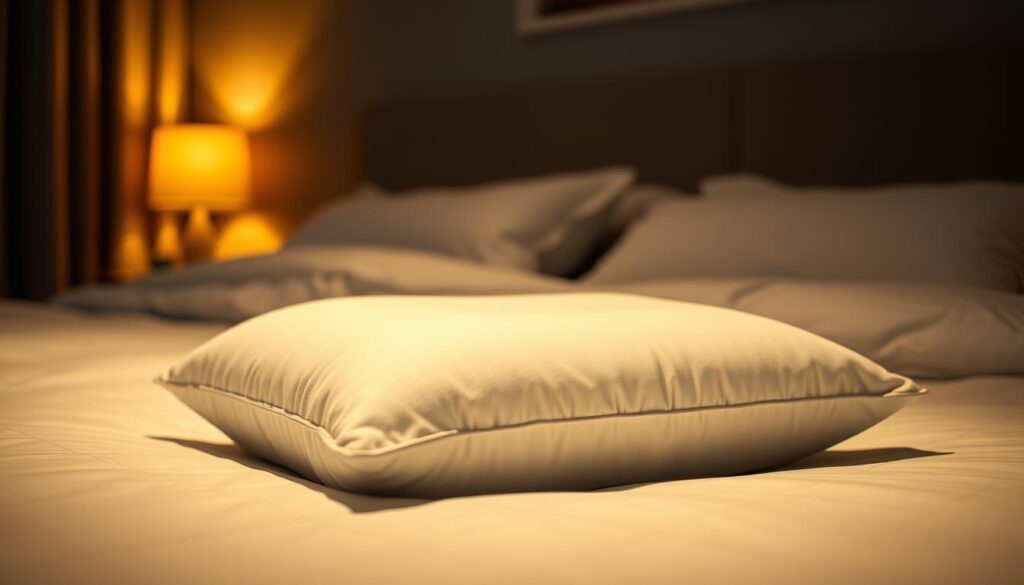
Memory Foam and Cervical Pillows
Memory foam and cervical pillows provide proper neck and spine alignment, helping to maintain open airways during sleep. Cervical pillows, with their contoured design, support the natural curve of the neck, which is particularly beneficial for side sleepers with sleep apnea.
|
Pillow Type |
Key Benefits |
Suitable Sleeping Position |
|
CPAP-Specific Pillows |
Accommodates CPAP mask and tubing, reduces air leaks |
Various positions |
|
Wedge Pillows |
Elevates upper body, reduces apnea events |
Back sleepers |
|
Memory Foam/Cervical Pillows |
Provides neck and spine alignment, maintains open airways |
Side sleepers |
Some pillows combine multiple features, such as memory foam wedges or cervical CPAP pillows, to address several needs simultaneously. By choosing the right pillow, individuals with sleep apnea can significantly improve their sleep quality and overall comfort.
The Best Sleep Apnea Pillows
Sleep apnea pillows are designed to address the unique challenges faced by individuals with sleep apnea, providing both comfort and therapeutic benefits. Our selection of the best sleep apnea pillows is based on rigorous evaluation criteria, including comfort, effectiveness, durability, and user reviews.
EnduriMed CPAP Pillow
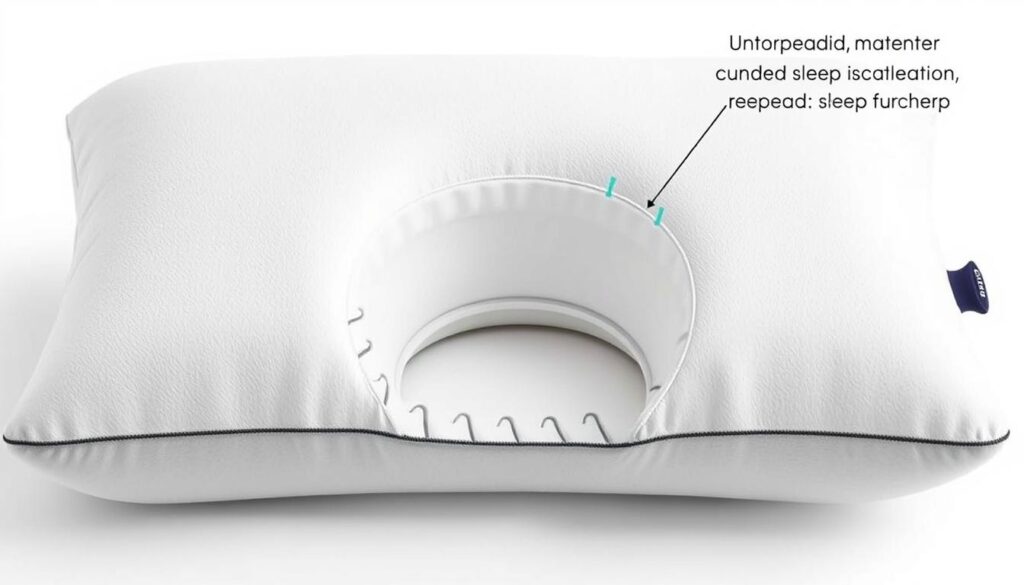
Features and Design
The EnduriMed CPAP Pillow is specifically designed for CPAP users, featuring specialized cutouts that accommodate CPAP masks and tubing, reducing mask displacement during sleep. Its memory foam construction provides excellent support and comfort.
The pillow’s design helps prevent leaks by minimizing the pressure on the CPAP mask, ensuring a more effective sleep apnea treatment.
Pros and Cons
Pros: Effective in reducing mask leaks, comfortable, and supportive. The unique cutouts are particularly beneficial for CPAP users.
Cons: Some users may find it too firm, and it may retain heat due to its memory foam construction.
Contour Products CPAP Pillow 2.0
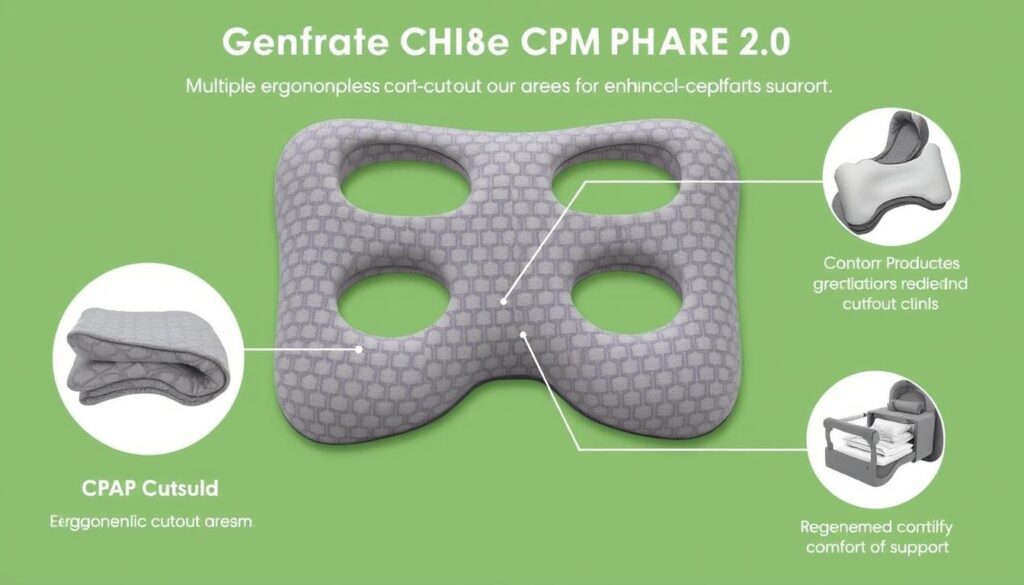
Features and Design
The Contour Products CPAP Pillow 2.0 is an improved version of its predecessor, offering multiple cutout areas to accommodate various CPAP mask types. It supports different sleeping positions, making it versatile for users.
This pillow is designed to work with a variety of CPAP masks, providing flexibility and comfort for users who switch between different mask types.
Pros and Cons
Pros: Versatile, comfortable, and effective in reducing mask displacement. The multiple cutout areas are a significant advantage.
Cons: Some users may find the cutouts too large or too small, depending on their mask size.
Lunderg CPAP Butterfly Pillow
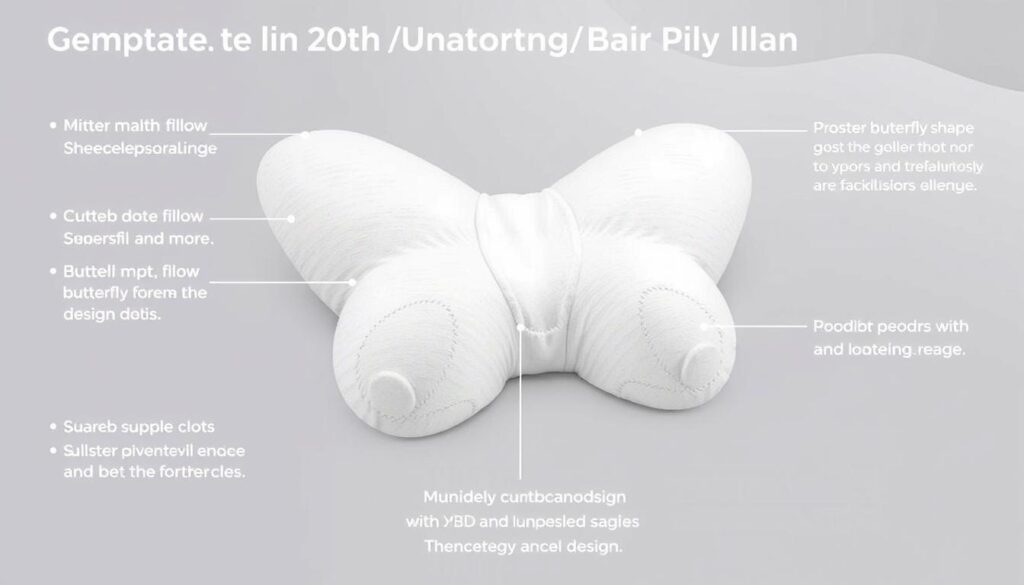
Features and Design
The Lunderg CPAP Butterfly Pillow features a unique butterfly shape that provides excellent support for side sleepers while accommodating CPAP equipment. It is designed to keep the CPAP mask in place, reducing leaks and improving sleep quality.
This pillow is made with breathable materials that help regulate temperature, keeping the user cool during sleep.
Pros and Cons
Pros: Excellent for side sleepers, breathable, and keeps the CPAP mask in place effectively.
Cons: The unique shape may not be suitable for back or stomach sleepers, and some users may find it too firm.
Cushy Form Bed Wedge Pillow
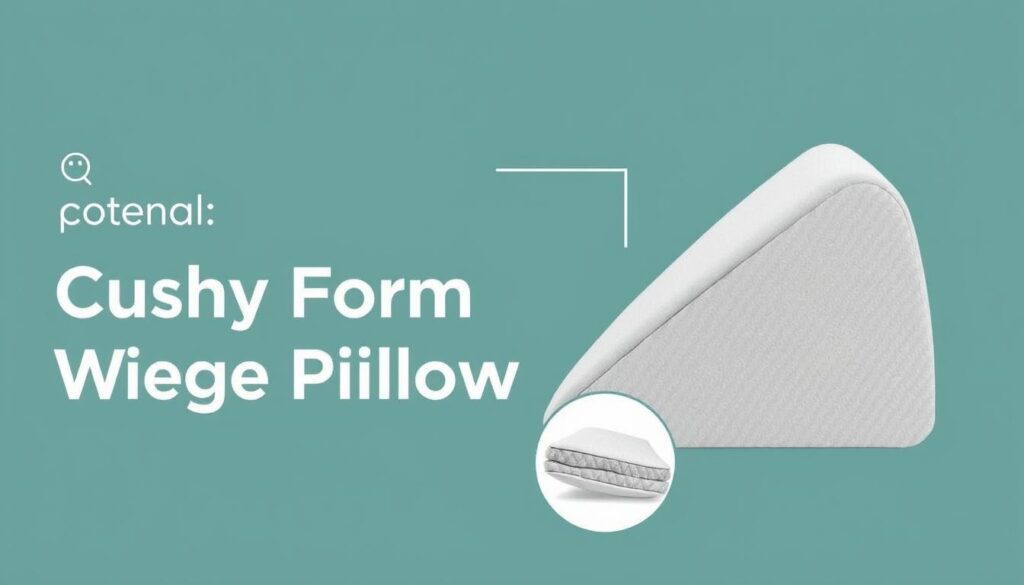
Features and Design
The Cushy Form Bed Wedge Pillow is designed to elevate the upper body, reducing apnea events by improving airflow. Its memory foam construction provides both comfort and support.
This pillow is beneficial not only for CPAP users but also for individuals with sleep apnea who do not use CPAP therapy.
Pros and Cons
Pros: Effective in reducing apnea events, comfortable, and supportive. Suitable for both CPAP users and non-users.
Cons: The inclined design may not be comfortable for all users, and it may be too large for some beds.
Core Products Tri-Core Cervical Pillow
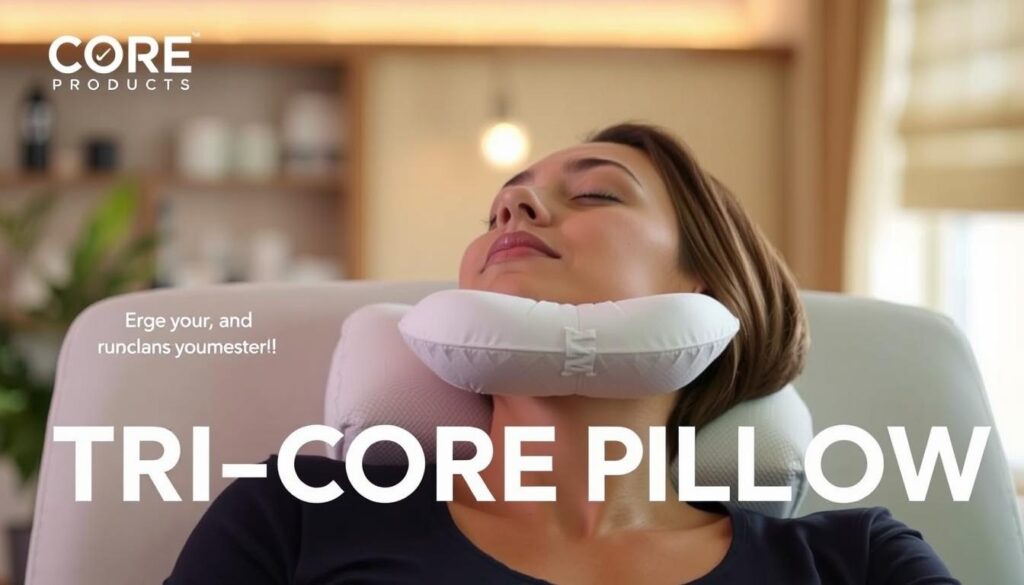
Features and Design
The Core Products Tri-Core Cervical Pillow is designed to support proper neck alignment, featuring different sleeping surfaces for various positions. It helps maintain open airways, reducing the severity of sleep apnea.
This pillow is made with a unique tri-core design that provides both comfort and support, making it suitable for a wide range of sleeping positions.
Pros and Cons
Pros: Excellent for maintaining proper neck alignment, comfortable, and supportive. Suitable for various sleeping positions.
Cons: Some users may find it too thick or too thin, depending on their preferred loft.
How to Choose the Right Sleep Apnea Pillow
For individuals with sleep apnea, finding the perfect pillow is not just about comfort; it’s about alleviating symptoms and enhancing sleep. The right pillow can significantly impact the severity of sleep apnea symptoms and overall sleep experience.
Consider Your Sleeping Position
Your sleeping position plays a crucial role in determining the best pillow for sleep apnea. Side sleepers benefit from contoured pillows that maintain proper neck alignment and accommodate CPAP masks. Back sleepers should consider wedge pillows to elevate the head and reduce airway obstruction. Although not ideal for sleep apnea, stomach sleepers need thin, soft pillows to minimize neck strain.
Material and Firmness Options
The material and firmness of the pillow are also critical factors. Memory foam pillows offer consistent support and pressure relief, while latex pillows are hypoallergenic and durable. Wool and cotton pillows help regulate body temperature, and specialized cooling materials can be beneficial for those who sleep hot. In terms of firmness, medium-firm options typically provide the best balance of support and comfort for most sleep apnea sufferers.
CPAP Compatibility Features
For those using CPAP therapy, it’s essential to choose a pillow with CPAP compatibility features. Look for pillows with cutout designs that accommodate masks and tubing, materials that prevent mask shifting, and construction that minimizes air leaks. These features can significantly enhance the effectiveness of CPAP therapy and overall sleep quality.
Conclusion
In summary, selecting the appropriate sleep apnea pillow is crucial for improving sleep and overall well-being. While it cannot replace medical treatment, the right pillow can enhance comfort and potentially reduce apnea events.
Top recommendations include the EnduriMed CPAP Pillow for side sleepers using CPAP therapy, the Cushy Form Wedge for back sleepers, and the Core Products Tri-Core for cervical support. It’s essential to consult with a sleep doctor before making changes, especially for severe sleep apnea.
FAQ
What is the purpose of a CPAP pillow?
A CPAP pillow is designed to accommodate a CPAP mask and tubing, reducing air leaks and promoting a comfortable sleeping experience for individuals with sleep apnea.
How do I choose a pillow that is compatible with my CPAP mask?
When selecting a pillow, consider the design features that accommodate your CPAP mask and tubing. Look for pillows with cutouts or recesses that allow for a secure fit and minimize air leaks.
Can a CPAP pillow help reduce air leaks?
Yes, a CPAP pillow can help reduce air leaks by providing a comfortable and secure fit for your CPAP mask. This can lead to more effective CPAP therapy and improved sleep quality.
Are memory foam pillows suitable for side sleepers with sleep apnea?
Yes, memory foam pillows can be a good option for side sleepers with sleep apnea. They provide the necessary support and comfort to maintain proper spinal alignment and reduce pressure on the airway.
How often should I replace my CPAP pillow?
The frequency of replacing a CPAP pillow depends on various factors, including usage and maintenance. Generally, it is recommended to replace a CPAP pillow every 1-2 years or as needed.
Can a wedge pillow help alleviate sleep apnea symptoms?
Yes, a wedge pillow can help alleviate sleep apnea symptoms by elevating the upper body and promoting a more open airway. This can lead to improved breathing and reduced sleep apnea episodes.

